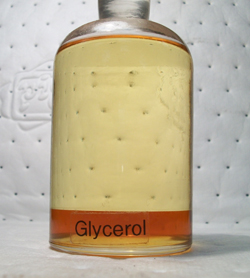The process to make biodiesel involves a chemical reaction. This means that the biodiesel industry is a chemical industry. Those involved in making biodiesel must have a good understanding of the underlying chemistry to ensure they are making quality fuel in a safe manner.
Biodiesel is an alternative fuel for diesel engines that is produced by chemically reacting a vegetable oil or animal fat with an alcohol such as methanol or ethanol. In words, the reaction is:
Oil + alcohol → biodiesel + glycerin
The photo shows a bottle of biodiesel and glycerin (also called glycerol). The biodiesel is the lighter-colored layer at the top. The darker-colored crude glycerin has settled to the bottom.

Bottle of biodiesel (top layer) and glycerol (bottom layer)
It is important to realize that unmodified vegetable oil, sometimes called straight vegetable oil (SVO) or waste vegetable oil (WVO), is not biodiesel. Some people have used SVO or WVO in diesel engines with varying degrees of success. The primary problem is the high viscosity and low volatility of the unmodified vegetable oils. Without exception, U.S. engine manufacturers have recommended against the use of SVO and WVO. More discussion of SVO and WVO can be found here.
Biodiesel is usually preferred over SVO and WVO because the chemical reaction converts the oil or fat into compounds that are closer to the hydrocarbons found in regular diesel fuel.
The chemical reaction that converts a vegetable oil or animal fat to biodiesel is called “transesterification.” This is a long name for a simple process of combining a chemical compound called an “ester” and an alcohol to make another ester and another alcohol. Oils and fats are included in the ester family. When they react with methanol or ethanol, they make methyl or ethyl esters and a new alcohol called glycerol or, more commonly, glycerin.
The vegetable oils and animal fats used to make biodiesel can come from virtually any source. All of these products consist of chemicals called triglycerides, so biodiesel can be made from soybean oil, canola oil, beef tallow, and pork lard, and even from such exotic oils as walnut oil or avocado oil.
Even used cooking oil or waste oil can be used to make biodiesel. However, these oils present special challenges for biodiesel production because they contain contaminants such as water, meat scraps, and breading that must be filtered out before the oil is converted to biodiesel.
Methanol is the most common alcohol used for making biodiesel. It is sometimes called methyl alcohol or wood alcohol. It is very toxic, and swallowing as little as a spoonful can cause blindness or even death. Dangerous exposure can also occur from breathing methanol vapors or absorbing methanol through skin contact. In the United States, ethanol is usually more expensive than methanol, so it is used less frequently to make biodiesel. It is the alcohol that is found in alcoholic drinks, so it is not toxic in small amounts. However, it is subject to very challenging government regulations because of the tax requirements associated with alcoholic beverages.
The chemical reaction used to make biodiesel requires a catalyst. A catalyst is usually a chemical added to the reaction mixture to speed up the reaction. Since the catalyst is not consumed in the reaction, it will be left over at the end in some form. In biodiesel production, the actual compound that catalyzes the reaction is called methoxide. One common way to make methoxide is to dissolvesodium hydroxide or potassium hydroxide in methanol. Large producers buy a solution of sodium methoxide in methanol that is much safer to work with.
High-quality biodiesel is defined by compliance with the American Society for Testing and Materials (ASTM) specification D6751. Fuel testing to verify compliance can be expensive, especially for small producers, but it is the most reliable way to ensure that fuel consumers will have access to high-quality fuel.